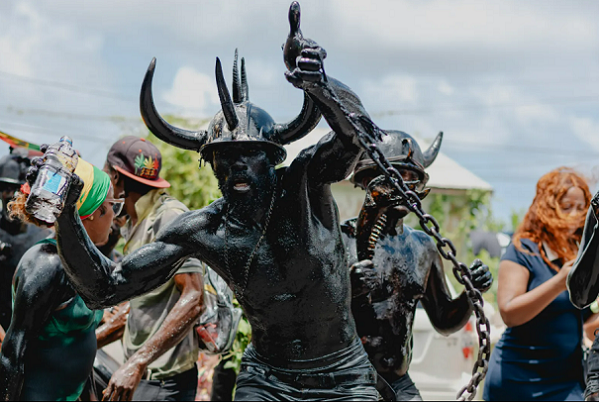

Mankaprr Conteh (Rolling Stone) writes, “At the island’s Spicemas celebrations, incredible music and viral traditions travel from the continent to the Caribbean.” Here are excerpts from this illuminating and heartfelt article. [Many thanks to Peter Jordens for bringing this item to our attention.]
The night after J’ouvert, the pinnacle of Grenada’s annual carnival, I cried and cried. All over the Caribbean and throughout its diaspora, the consecutive days of reverie known as carnival or mas are traditions rooted in African ancestral connection and resistance to colonization and slavery. This weekend, Londoners will celebrate Notting Hill Carnival, a multi-cultural evocation of Caribbean heritage maintained by their large West Indian immigrant community. On Labor Day, New Yorkers will do the same in Brooklyn. At a distance, the staunch political history of carnival can be easy to overlook on Instagram feeds full of beautiful Black people clad in feathers and rhinestones or neon paint and charcoal. But on the ground for Grenada’s carnival – dubbed Spicemas for the island’s trove of nutmeg, mace, cloves, and cinnamon – that legacy of rebellion is inescapable.
By 3:30 AM J’ouvert morning – a time named for the French colonizers’ term for dawn – I was up, slipping on some basketball shorts and a sports bra that I knew could be tossed out. I wrapped my shower-capped hair in a long black scarf that could go too. For J’ouvert, Grenadians “play” – in the customary nomenclature – Jab Jab, a centuries old tradition of blackening their skin with molasses and tar (or, more recently, motor oil or sustainable charcoal oil), donning horned helmets, and parading to their distinct sub-genre of soca music. Post-emancipation, it became a satirical take on the way white masters saw Black folks – as subhuman and grotesque – and reflect the horrors of slavery back to them. The term Jab Jab itself comes from the French term for devil. Though Grenada’s Jab Jab is distinct, it’s a ritual that spans the West Indies, where Caribbeans marched to say, “You think I’m a Black demon? I’ll show you a Black demon.”
When my travel group of journalists and influencers – sponsored by the Grenada Tourism Authority and its media partners – made it to the busy downtown streets just before sunrise, the roads were flush with youth throwing flames into the air with lighters and cans of bug spray and dragging chains like the ones that tethered their ancestors to ships across the Middle Passage. They jumped and moshed to dark, intense soca from the local stars of the season, especially the riotous “Bury All” by Lil Kerry. Some toted hyperrealistic props of bloody octopus tentacles in their mouths. There were a few Scream masks. As night grew to day, I saw the age range widen – elders danced joyfully in their black paint, a father doused his school-aged sons in oil as they splashed and played. I let random men pour their tubs of motor oil on me. I danced and marched for miles. I had never felt so free, so powerful, or so connected in a sea of strangers. So, that night, after bathing in the crystal blue ocean with sand and dish soap alongside hundreds of others (and two more showers), I wept in the bed of my Sandals suite.
Some tears were of pain. About 11 percent of Africans brought to Grenada as slaves between 1669 and 1808 are believed to have been Sierra Leonean, like my parents, whose direct lineage avoided the ships by grace alone. Many Grenadians are believed to be descendants of our own Temne tribe. I cried for those stolen from Sierra Leone and for the colonial shambles the country is still in. I cried for everything my family has continued to endure there. There were also tears of pride for all the resilience around me – my immigrant mother’s resolution to thrive, my dead grandmothers’ resolution to love, and the Grenadian resolution to carry Jab Jab traditions from African coasts to Caribbean plantations to the very city streets I walked so brazenly that day. [. . .]
For full article, see https://www.rollingstone.com/music/music-features/made-in-africa-grenada-carnival-history-politics-parties-1235413938
[Photo above: Querine Salandy for Chambers Media Solutions.]
Mankaprr Conteh (Rolling Stone) writes, “At the island’s Spicemas celebrations, incredible music and viral traditions travel from the continent to the Caribbean.” Here are excerpts from this illuminating and heartfelt article. [Many thanks to Peter Jordens for bringing this item to our attention.] The night after J’ouvert, the pinnacle of Grenada’s annual carnival, I cried and





